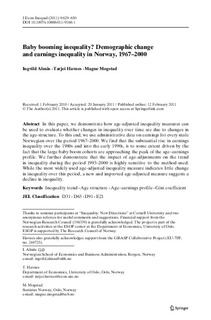Baby booming inequality? Demographic change and earnings inequality in Norway, 1967–2000
Journal article, Peer reviewed
Date
2011Metadata
Show full item recordCollections
- Articles (SAM) [119]
Original version
Journal of Economic Inequality, 2011, Volume 9, Number 4, Pages 629-650 10.1007/s10888-011-9168-1Abstract
In this paper, we demonstrate how age-adjusted inequality measures can
be used to evaluate whether changes in inequality over time are due to changes in
the age-structure. To this end, we use administrative data on earnings for every male
Norwegian over the period 1967–2000. We find that the substantial rise in earnings
inequality over the 1980s and into the early 1990s, is to some extent driven by the
fact that the large baby boom cohorts are approaching the peak of the age–earnings
profile. We further demonstrate that the impact of age-adjustments on the trend
in inequality during the period 1993–2000 is highly sensitive to the method used:
While the most widely used age-adjusted inequality measure indicates little change
in inequality over this period, a new and improved age-adjusted measure suggests a
decline in inequality.
Description
© The Author(s) 2011. This article is published with open access at Springerlink.com.
Publisher
SpringerJournal
Journal of Economic InequalityRelated items
Showing items related by title, author, creator and subject.
-
The rise and fall of income inequality in post-reform China: an empirical analysis of the development and determinants of income inequality in China in the period 1985-2015
Syslak, Daniel (Master thesis, 2019)Over the last couple of decades, there has been progressive commitment and remarkable achievements by the international community in lifting people out of poverty across the world. At the same time, elevated levels of ... -
Fairness and inequality : measuring fairness preferences and identifying the unfair income inequality in Germany
Stavem, Frøya Plahte; Støren, Bendik Nagel (Master thesis, 2016)The standard measures of economic inequality seem not to be in accordance with the way people tend to think about inequality. Rather than considering all economic inequality unfair, people seem to accept inequalities arising ... -
Baby booming inequality?: demographic change and inequality in Norway, 1967-2004
Almås, Ingvild; Havnes, Tarjei; Mogstad, Magne (Discussion paper, Working paper, 2010-02)We demonstrate how age-adjusted inequality measures can be used to evaluate whether changes in inequality over time are because of changes in the age structure. In particular, we explore the hypothesis that the substantial ...
